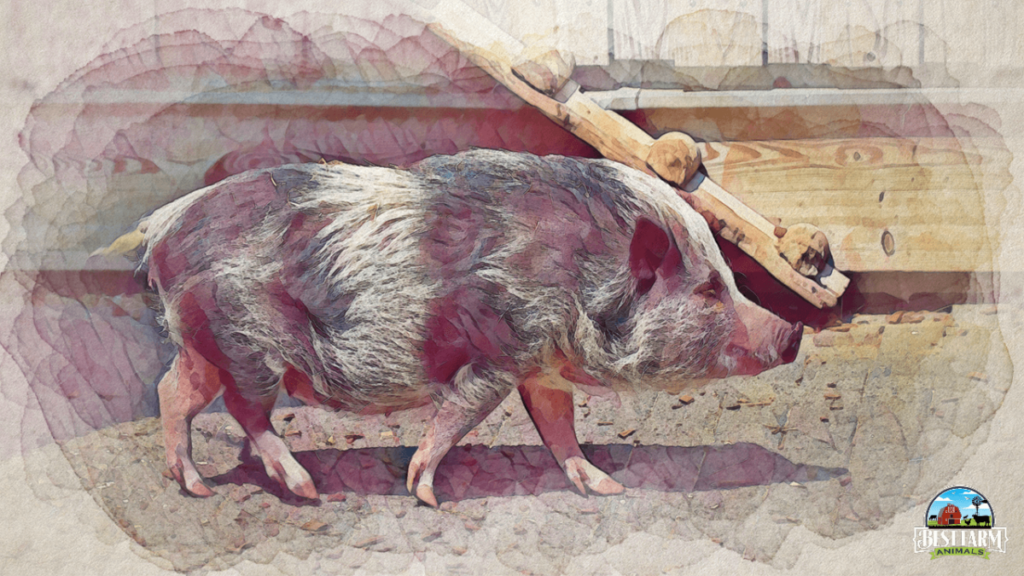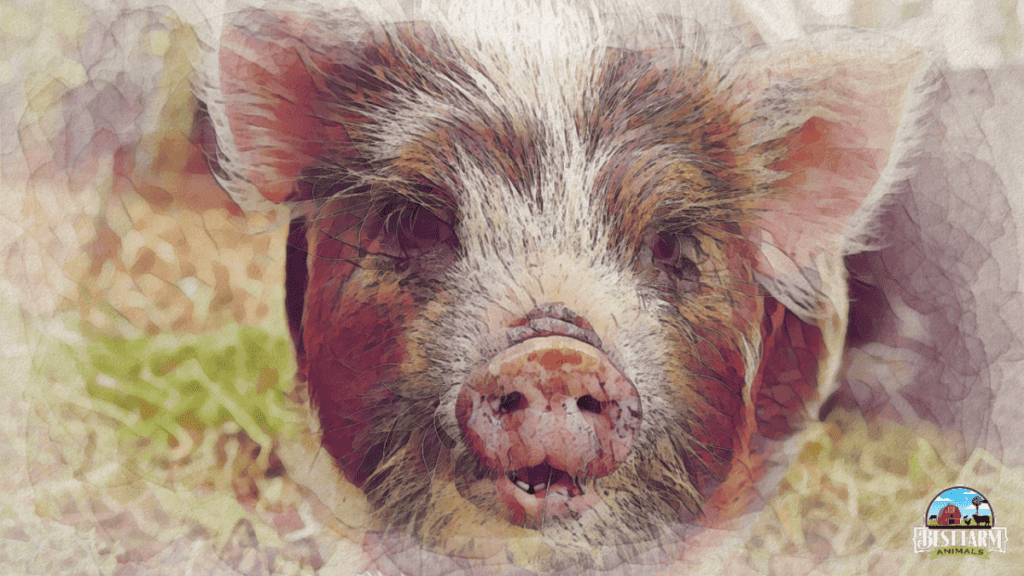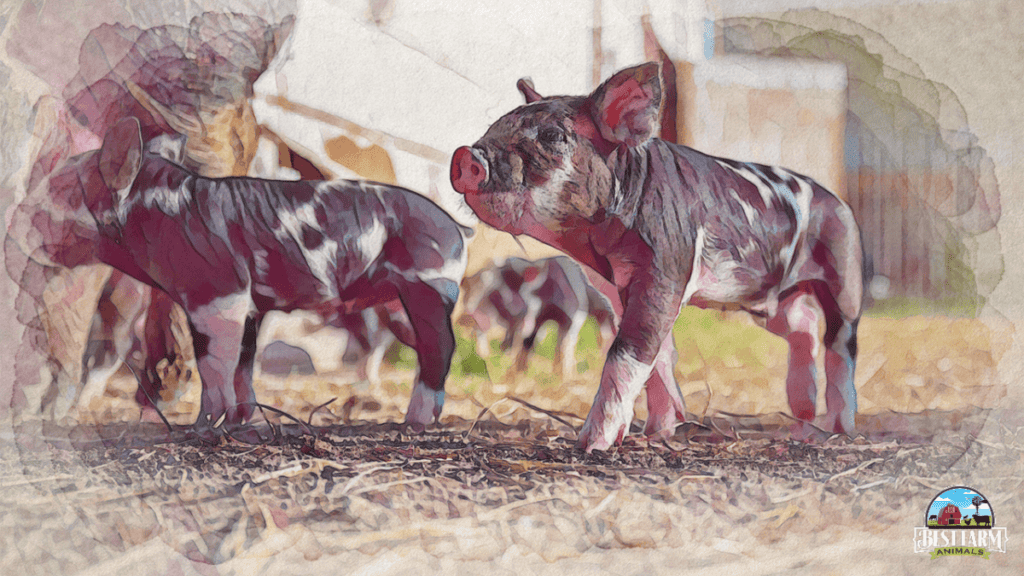As someone who has spent years raising KuneKune pigs, I can confidently say that they make exceptional pets. These adorable creatures have won my heart with their unique personality, charming appearance, and friendly demeanor.
Let me share my firsthand experience of why KuneKune pigs are the perfect addition to any family.
One of the most striking features of KuneKune pigs is their size. Unlike traditional farm pigs, KuneKunes are small in stature, making them ideal for households with limited space. This breed typically reaches a height of 20-26 inches and weighs around 120-240 pounds. Their compact size allows them to adapt well to different living environments, whether it’s a spacious backyard or a smaller urban setting.
KuneKune pigs are coming back from near extinction. Their name means fat and round in the Maori language, in New Zealand, where Kunekune pigs originated.
Table of Contents
Why KuneKune Pigs Make Great Pets
Kunekune pigs are shy, gentle, and very calm. They may be one of the mildest breeds of pigs. They appear harrier than most pig breeds and are one of the only ones that don’t root.
They are one of the smallest pigs available. Females will reach as much as 175 lbs, while males will grow to as much as 250 lbs. Check out other awesome pig breeds that make great pets!
KuneKune Pigs Have A Great Personality
What truly sets KuneKune pigs apart is their temperament. These pigs are known for their docile nature and gentle disposition. Over the years, I have found them to be incredibly sociable animals, eagerly seeking human companionship.
They are curious, affectionate, and form strong bonds with their owners. KuneKunes thrive on attention and love to be part of the family, which makes KuneKune pigs excellent pets for households with children or other animals.
Another delightful aspect of KuneKune pigs is their low-maintenance nature. Unlike some other pig breeds, KuneKunes have a natural tendency to graze on grass and forage. This means that they require less feed and can supplement their diet with vegetation.
Of course, providing them with a well-balanced diet is important to ensure their nutritional needs are met. But their ability to adapt to various feeding options, including pasture grazing, makes pigs relatively easy to care for.

Grooming KuneKune Pigs
In terms of grooming, KuneKune pigs have a thick, bristly coat that doesn’t require much attention. Occasional brushing helps keep their coat in good condition and removes any loose hair.
Their short snouts and upturned noses make them less prone to rooting and digging, reducing the chances of damage to your garden or yard. KuneKunes are known for being clean animals, and with proper bedding and maintenance, they can be kept indoors or outdoors without causing much mess.
Physical Characturistics of a KuneKune Pig
Beyond their delightful personalities and low-maintenance care, KuneKune pigs also possess distinctive physical features that add to their charm. Their round bodies, short legs, and tufted forelocks give them an adorable and almost cartoon-like appearance. They come in a variety of colors and patterns, including black, ginger, brown, and white, making each KuneKune pig a unique and visually appealing companion.
They are known for their distinct “tassels” that hang from their lower jaw and are, on average, four centimeters long. They can also subsist entirely on grass and hay. Because they don’t root, they won’t tear up your lawn as much as other pig varieties will.

How Much Does It Cost To Feed A KuneKune Pig?
The cost of feeding a KuneKune pig can vary depending on several factors, including the pig’s size, age, activity level, and the availability of grazing or foraging opportunities. Here are some considerations regarding the cost of feeding a KuneKune pig:
- Grazing and Foraging: KuneKune pigs are naturally inclined to graze on grass and forage for vegetation. Having access to ample pasture or grazing areas can significantly reduce the cost of their feed. However, if pasture is limited, you may need to supplement their diet with additional feed.
- Commercial Feed: KuneKune pigs typically require a balanced diet to meet their nutritional needs. You can find commercially formulated pig feed specifically designed for miniature or pot-bellied pig breeds. The cost of commercial feed can vary depending on the brand, quality, and availability in your area.
- Feed Quantity: The amount of feed your KuneKune pig requires will depend on factors such as its age, weight, and activity level. Piglets will require smaller portions initially and gradually increase their intake as they grow. Adult pigs generally consume around 1-2% of their body weight in feed per day.
- Supplemental Feed: In addition to commercial pig feed, you may consider providing your KuneKune pig with supplemental fruits, vegetables, and occasional treats. These can add to the overall cost of feeding, but they provide enrichment and variety in their diet.
- Seasonal Variations: The cost of feeding may vary seasonally, especially if grazing is limited during certain times of the year. In colder months or regions with limited access to pasture, you may need to increase the amount of commercial feed or provide alternative forage options.
Providing an exact cost estimate for feeding a KuneKune pig is challenging since it can vary significantly based on individual circumstances. However, as a rough estimate, the annual cost of feeding a KuneKune pig can range from a few hundred to a few thousand dollars, depending on the factors mentioned above. It is advisable to consult with local breeders, veterinarians, or agricultural experts for more accurate cost estimates specific to your location and situation.

KuneKune FAQs
What is a KuneKune pig?
KuneKune pigs are a small, docile breed of pig originating from New Zealand. They are known for their compact size, friendly temperament, and unique appearance.
How big do KuneKune pigs get?
KuneKune pigs typically reach a height of 20-26 inches and weigh between 120-240 pounds, depending on factors such as genetics and nutrition.
Are KuneKune pigs good pets?
KuneKune pigs make great pets! They are known for their friendly and sociable nature, forming strong bonds with their owners. They can adapt well to different living environments, making them suitable for various households.
What do KuneKune pigs eat?
KuneKune pigs have a natural tendency to graze on grass and forage for vegetation. They require a balanced diet that includes commercial pig feed, fresh fruits, vegetables, and occasional treats. Access to grazing areas can significantly reduce feeding costs.
Can KuneKune pigs be house-trained?
KuneKune pigs can be house-trained. They can learn to use a litter box or designated outdoor area for their bathroom needs with patience and consistency.
Do KuneKune pigs require a lot of space?
KuneKune pigs are smaller than traditional farm pigs, making them suitable for households with limited space. While they benefit from outdoor access and grazing opportunities, they can adapt to living in smaller areas with proper care and enrichment.
Are KuneKune pigs good with children?
Yes, KuneKune pigs are generally good with children. They are friendly and gentle, making them suitable companions for families with kids. However, supervision is always recommended to ensure the safety of both the pig and the child.
How long do KuneKune pigs live?
KuneKune pigs have a relatively long lifespan compared to other pig breeds. On average, they can live for 15-20 years with proper care, nutrition, and veterinary attention.
Are KuneKune pigs noisy?
KuneKune pigs are not particularly noisy animals. They are generally quiet and vocalize mostly during feeding or when seeking attention. They are less likely to produce loud and disruptive sounds compared to larger pig breeds.
Do KuneKune pigs require any special care?
While KuneKune pigs are relatively low-maintenance pets, they still require proper care. This includes regular veterinary check-ups, a balanced diet, adequate shelter, and opportunities for socialization and mental stimulation.
Conclusion
In conclusion, my years of experience raising KuneKune pigs have convinced me that they are exceptional pets. Their small size, friendly temperament, low-maintenance care, and charming appearance make them a wonderful addition to any household.
Suppose you’re looking for an affectionate and sociable pet that will bring joy and companionship to your life. In that case, I wholeheartedly recommend considering a KuneKune pig as your new furry family member. Another breed you might consider is a pot bellied pig.
My Most Used Pig Supplies
This list contains affiliate products. Affiliate products do not cost more but helps to support BestFarmAnimals and our goal to provide farm animal owners with accurate and helpful information.
Purina Pig Chow will last well (or Mazuri is popular, but I haven’t tried it), and the stainless steel non-skid bowls that will help keep the mess down.
A pig blanket to keep her warm. This one also has bright colors and helps to provide rooting without the destruction.
Pig Harness for walking and handling your pig. There are a lot to choose from, but this one is pretty easy to use. If you want one that has a separate leash, this looks like a good one.
A large crate for keeping her safe in your house at night and when you leave the house. This is essential. You’ll also want a litterbox, and I like mine with a lid for nighttime. Pine shavings are best, and you may be able to find them in larger quantities locally.
When you have accidents, Odoban will help eliminate odors. When you are potty training, these floor pads work great for keeping your house clean while training her to go in certain places.
You’ll also want an outdoor house to keep her warm when she gets outside time, an essential part of her development.
Dewormer- Ivermectin is the primary dewormer I use, although I do rotate with a non-ivermect ingredient once so that the worms don’t get immune to it.

